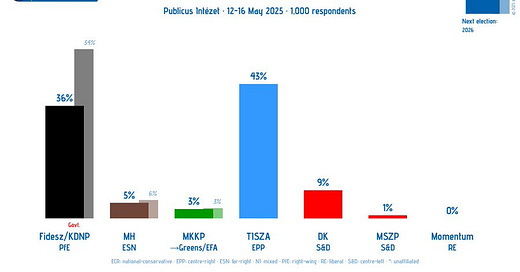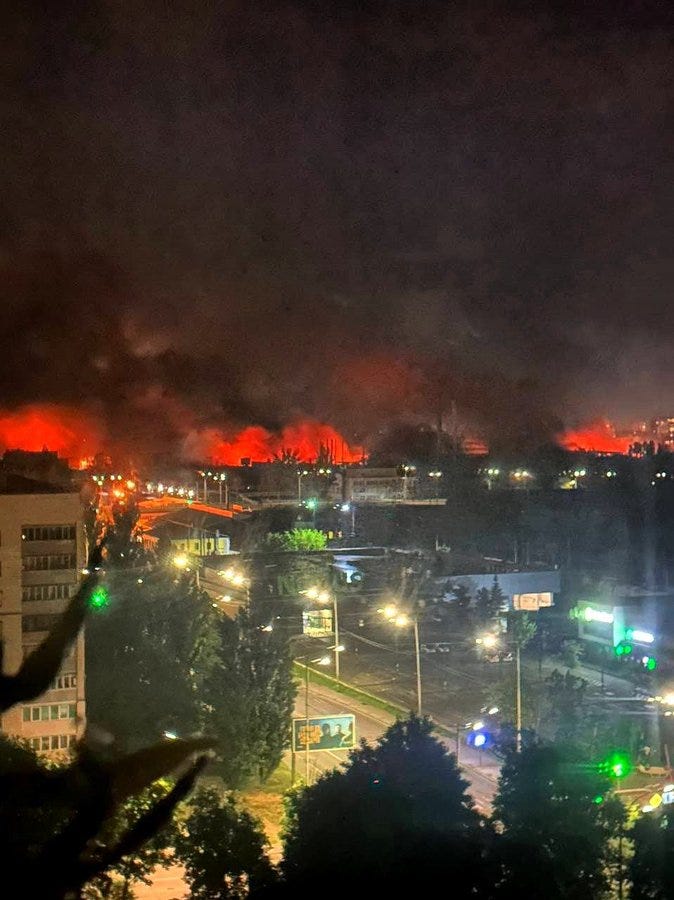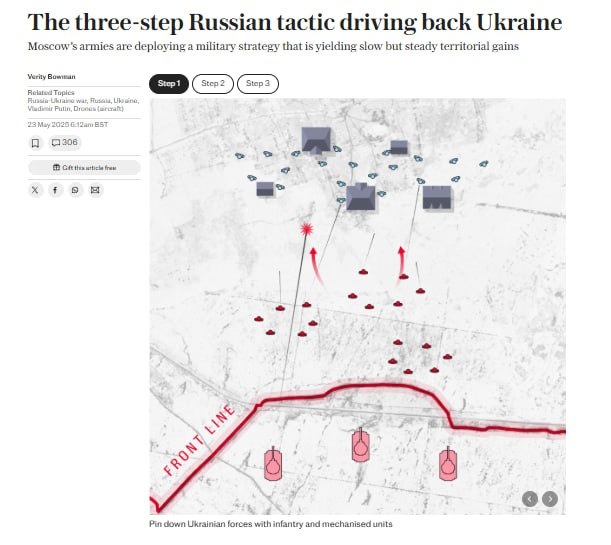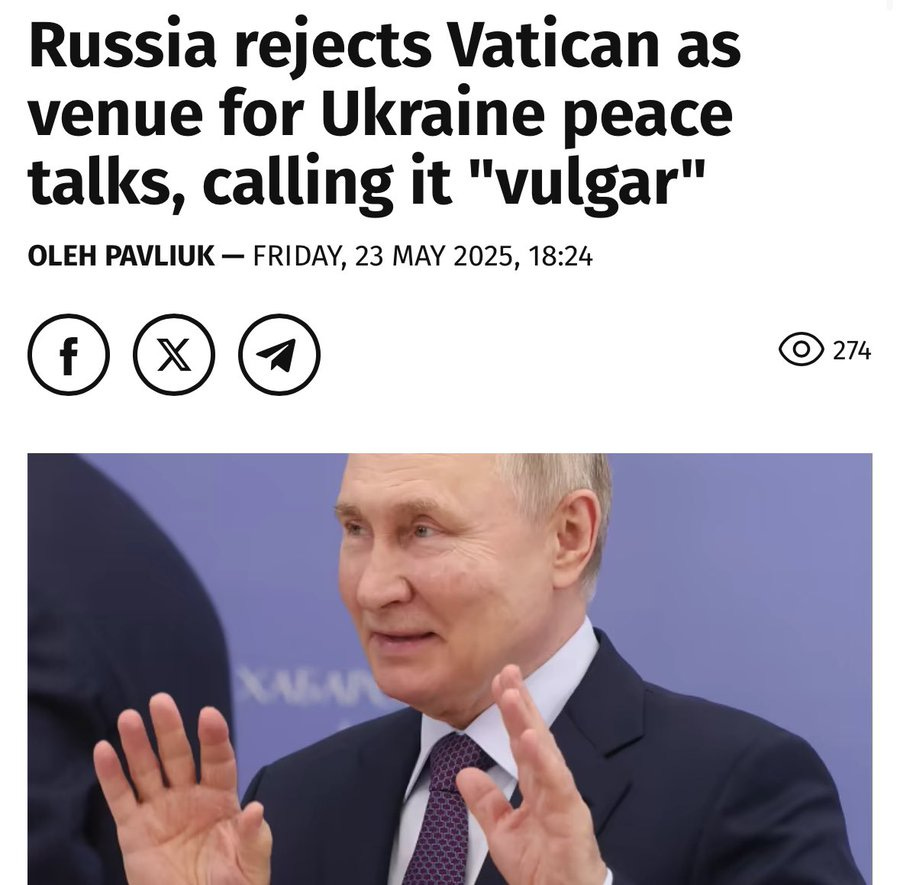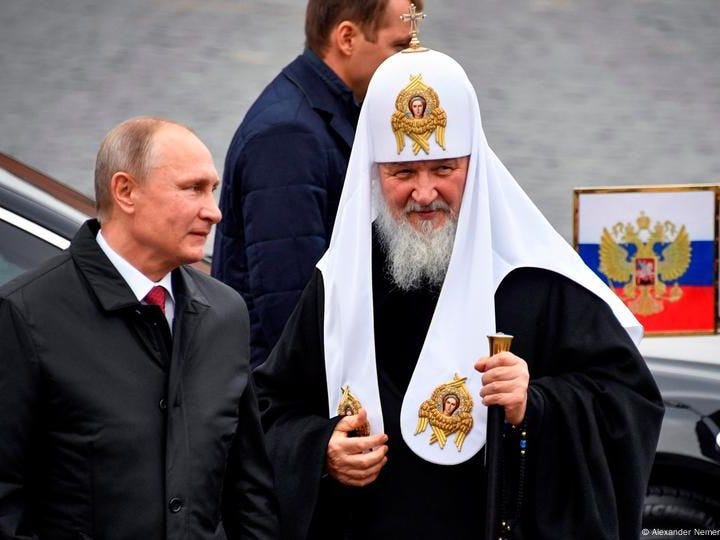Catching up…
For specific news about Trump, his regime and its dealings with Russia, I direct you to Olga’s substack. She and Julie Roginsky publish a weekly podcast, “Pax Americana”, which is highly informative.
For a general view of news from various geopolitical threatres, Scott’s EA Worldview is always superb.
Let’s get going…
Stories we’re following…
May 23: In the first phase, "390 Ukrainians returned from Russian captivity under the Istanbul agreements. Military and civilians, men and women — each one of them is ours. The only goal in forming the lists was to save lives. We expect new exchanges in the coming days." — Defense Minister Rustem Umerov.
May 24: Ukraine brings home 307 POWs in 2nd phase of 1,000-for-1,000 prisoner swap with Russia.
On Friday, Russian forces have attacked Odesa’s port infrastructure with two ballistic missiles, killing two people and injuring eight, four of whom are in a serious condition, reported Oleh Kiper, Head of Odesa Oblast Military Administration, on Telegram. "The enemy struck Odesa’s port infrastructure with two ballistic missiles. One person was killed, and eight were injured."
On the night of May 24, Russia launched 14 ballistic missiles and 250 Shahed drones in a massive attack targeting Kyiv and several regions. Ukrainian air defense shot down 6 Iskander-M/KN-23 missiles and neutralized 245 drones using a coordinated response from aviation, SAM systems, electronic warfare, and mobile fire units.
Russia strikes Odesa port with ballistic missiles, kills 2, injures 7. Four of the wounded are in serious condition, Odesa Oblast Governor Oleh Kiper said.
8 injured as Russia hits Kyiv with drones, ballistics hours after largest prisoner exchange kicks off. Heavy Russian drone and ballistic attacks against Kyiv during the night on May 24. At least eight people were wounded as multiple waves of explosions rocked Kyiv overnight on May 24 during a massive Russian drone and missile attack. Two of the injured were hospitalized.
Mariupol: French TV channel BFM managed to film a video story in occupied Mariupol called “I want to become an FSB agent”: Russification of the young generation is underway in Mariupol.”
Journalists showed the last bell in one of the local schools, where schoolchildren stand to the Russian anthem and then carry a giant tricolor. The military is also present at the assembly, handing out diplomas to the children.
One of the children says that in the future he wants to become an “FSB agent” to “catch terrorists.”
Day four of drone strikes: Overnight, another wave of drones slammed into Russian territory. Moscow says 94 were "shot down," but reports speak of explosions near Yelets—already hit recently—and the NAK Azot chemical plant in Novomoskovsk, Tula region.
Ukraine’s Border Guard Service reports that 8 Afghan nationals attempted to illegally cross into Ukraine from Belarus via Rivne region. One tried to flee but was swiftly apprehended. Authorities are working to identify possible facilitators.
Timothy Garton Ash: In Ukraine, I saw Trump’s ‘peace deal’ wouldn’t just trade away land – but lives, memories and homes
The next time a breathless news anchor talks about the prospect of a war-ending “deal”, with Ukraine “ceding land for peace”, I want to sit them down with Adeline. In Lviv last week, Adeline showed me on her phone map her lost home in Russian-occupied Nova Kakhovka, just across the Dnipro River from the Ukrainian-liberated territory around Kherson. Look, she said, with tears welling up in her eyes, here on this satellite snapshot you can see the ecological disaster that followed Russia’s destruction of the Kakhovka dam in 2023. And here’s the place where she dreamed of setting up a small art gallery. “Why should I give up on my home?” she cried. Why indeed.
The territory occupied by Russia is the size of Portugal and Slovenia combined. It’s difficult to get accurate figures, but perhaps some 5 million people live there, while at least another 2 million refugees from those territories are now elsewhere. Inside the occupied territories, Ukrainians face brutal repression and systematic Russification. Outside, refugees like Adeline are left with only their memories, old photographs and the keys to lost homes. We should not whitewash this monstrous ongoing crime of occupation with the soothing words “land for peace”.
No one in Ukraine believes that any “deal” will end the war for good, even if negotiations eventually produce a fragile ceasefire. It’s not just “land” that Russia has taken by brutal conquest; it’s the homes, family histories, lives and livelihoods of millions of individual men, women and children. Ukraine is not “ceding” territory any more than I “cede” my car if a criminal steals it and I can’t get it back. Above all, this will not be peace. A just peace, with Adeline going home following the liberation of all Ukrainian territory, reparations being paid by Russia and Vladimir Putin on trial in The Hague, is unachievable in the foreseeable future. But anything seriously meriting the label “peace” requires the achievement of durable military security, economic recovery, political stability and European integration for the roughly four-fifths of its sovereign territory that Ukraine still controls. That will take years.
Please notice the date of this post by former Ukrainian diplomat, Olexander Scherba.
Combat Situation
Bloomberg—US Intelligence: Putin remains committed to victory in Ukraine. A new assessment says Moscow is betting on a war of attrition—aiming to wear down Ukraine’s resistance, demoralize its population, and wait out Western support. Despite slow advances, Russia likely sees the pace as acceptable.
Russia has enough "manpower and metal" to sustain its war effort for at least two more years, says U.S. European Command chief Gen. Christopher Cavoli. Despite heavy losses, Moscow retains the capacity to continue the fight at its current pace.
Russia's upgraded ballistic missiles harder to intercept by Patriots, Air Force says.
"It complicates (the interception), but doesn’t make the interception impossible," Ukraine's Air Force spokesperson Yurii Ihnat said. "I think our partners are already working to improve the system's capabilities."
ISW: Ukrainian forces advanced near Toretsk, and Russian forces advanced near Novopavlivka and Kurakhove.
The Telegraph: Russia is employing a “triple chokehold” tactic on the battlefield—ground assaults pin Ukrainian forces, drones block retreats, and glide bombs wipe out defenses—forcing defenders to choose between high losses or exposure to drone strikes, reports The Telegraph.
Kyiv’s forces are facing severe pressure on multiple fronts while Russia works to edge them towards exhaustion by integrating three combat elements into a cohesive strategy greater than the sum of its parts.
“The whole Russian army is using the triangle strategy,” said Serhii Kuzan, the chairman of the Ukrainian Security and Cooperation Centre. “We call it the strategy and war of exhaustion.”
Behind the Lines
Polish jets intercept Russian bomber over Baltic Sea after 'dangerous' maneuvers. According to Polish Defense Minister Wladyslaw Kosiniak-Kamysz, the Russian aircraft posed a threat to regional airspace safety.
Two Russian military aircraft are suspected of violating Finnish airspace off Porvoo on the afternoon of May 23, 2025. The Border Guard is investigating the case and will provide more information as the investigation progresses. "We take the suspected territorial violation seriously and an investigation is underway," says Minister of Defense Antti Häkkänen.
This is what I’ve been dreading for quite some time: the moment when we will not be able to distinguish from what is real or not. None of the newscasters are real. Of course, what they say is ridiculous, so we know it isn’t factual. In a previous E-Stories edition, I wrote about what a video such as this could be used for combined with other gray zone warfare tools.
Let’s say Nika lives in Finland, and she begins seeing strange videos about an enemy force streaming through the border, the kidnapping of Finnish soldiers, an attack on a Finnish border city of some sort, or people running to get money from ATMs. Think of any event that could sow panic among the population. Then the lights go out almost immediately for a few hours due to a cyber attack—phones are down, as is internet access. There’s no communication. Nika doesn’t know what to do, and neither do her neighbours. They descend to their shelters to emerge when the lights come back on after a few hours. Everything is normal but they are all left with a sense of unease and confusion. The media and political authorities will be scrambling to understand what just happened, and who was behind it, but that will take time.
The same happens to an increasing degree over a specific period of time, but what is disseminated across social media or Doppelganger websites is just a little different, not as dramatic: a corruption scandal involving the government, a prominent businessman or politician caught sniffing cocaine with some prostitutes, a mudslide over a major highway that really didn’t happen, a deeply disturbing mass casualty event at a school or a supermarket perhaps in a town that doesn’t even exist. There are enough real life videos circulating about mass casualty events that malign actors could use the material to create fake events that are totally credible. Along with these videos are those that show street fights and random violence. This is what was done before the U.S. presidential election by Chinese malign actors.
One other consideration is that the videos change to target individuals or specific cohorts (cognitive warfare): Nika could be watching a plane crash and learns her nation’s prime minister aboard, while her neighbour receives a video that saying it was the Finnish Minister of Defence instead.
What malign actors are seeking to do is erode our sense of reality and ultimately, our trust in government, the media and judicial system. They are most likely in a position to do so now. Confusion and choas lead to civil unrest, a run on the banks, demands for elections, or turning to populist parties that promise to restore order.
We’ve seen quite a few videos that were created to amuse us (politicians morphing, baby Trump, cat and dog videos. I dare say that in some cases, they are tests.
The good new is that the NATO cognitive warfare unit has been working on mitigation strategies involving the use of advanced persistent manipulators like the video below for quite a few years. It’s now time to raise public awareness of how deepfakes can be used, so national publics are not caught off guard when they begin to flood social media platforms.
Finnish Defence Forces are considering changes to the number of wartime troops and also to the current method of fighting. Commander of the Defence Forces, General Janne Jaakkola tells that Finland is doing everything to avoid similar warfare as we see in Ukraine today.
Russia's mobile, fast, and mechanized warfare has now stalled into a war of attrition. The reason is the proliferation of drones, the effectiveness of electronic warfare, advanced sensors, and long-range weapons such as artillery and rocket launchers.
According to Jaakkola, however, Finland must have the ability to defend itself in advantageous locations so that the enemy's actions are not simply a pass-through.
Portnov Update: Portnov visited Ukraine days before being killed in Madrid, news outlet reports. According to three Ukrainian Pravda's interlocutors with knowledge of Portnov's movements — including sources in law enforcement and his inner circle — he was in Ukraine on May 17-18 and reportedly met with top law enforcement officials.
The U.S.-Ukraine Reconstruction Fund has officially launched yesterday, Ukraine’s First Deputy PM Svyrydenko announced—all formalities with the U.S. side have been completed.
JPMorgan Chase Report: The Russia-Ukraine Endgame and the Future of Europe. JPMorgan analysts believe the war in Ukraine is entering its final phase and expect fighting to freeze by the end of Q2 2025.
As Europe runs low on weapons, Ukraine on fighters, the U.S. on patience, and transatlantic unity frays, President Zelenskyy will likely be forced to accept a negotiated settlement with Russia sometime this year that freezes the fighting but stops short of a comprehensive peace agreement. Putin’s losses are also far from sustainable. At its current rate of gain, Russia will control all of Ukraine in about…118 years. So Putin will aim to cut a deal that is favorable to his overall goal to eventually control Kyiv. 2025 was always going to be the year of negotiation, and the endgame is here.
They see a 50% chance of a “Georgian scenario” — no foreign troops, weak support, stagnation, and Ukraine drifting into Russia’s sphere of influence.
Israeli (20%) – Long-term Western military and economic aid, no foreign troops. Ukraine becomes a fortified buffer, but no peace deal.
South Korean (15%) – Ukraine keeps 80% of its territory, develops as a stable democracy with U.S. protection, but doesn’t join NATO.
Belarusian (15%) – Worst-case: U.S. pulls out, Europe falters, Ukraine capitulates and becomes a Russian vassal. Global order collapses.
Mo: Who put this report together is my question, and why. The worst case scenario for Ukraine is that it loses it entire territory, and war results in Europe some time afterwards.
Meanwhile in Russia & China…
Rosneft has become the owner of the key rare earth deposit in Russia, Tomtor, Reuters reports, citing data from the Unified State Register of Legal Entities. The oil producer received 100% of the project operator Vostok Engineering as of May 20, the documents say. Tomtor, in northwestern Yakutia, is Russia's flagship project to boost domestic production and reduce reliance on Chinese imports of rare earth metals critical to electronics and defense.
Kyiv Insider: Russia’s Coal Industry in Crisis: Prime Minister Convenes Emergency Meeting as Exports and Revenues Collapse.
Today, Russian Prime Minister Mikhail Mishustin announced an emergency meeting to address the ongoing collapse in the country’s coal sector. T
Two years ago, Russia produced 432.5 million tonnes of coal for the whole of 2023, a decline from 439 million tonnes in 2022. According to the International Energy Agency (IEA), production is expected to fall further by 3% in 2025, reaching around 416 million tonnes.
Coal exports, which once brought billions in foreign currency, are plummeting. Russia shipped 199 million tonnes of coal abroad in 2022, but that figure fell by 4% in 2023 and dropped another 8% in 2024. Projections for 2025 suggest a further 7% decline, to around 185 million tonnes.
Russia’s top exporters slash rail shipments amid economic slowdown, Reuters reports. A document seen by Reuters reveals that firms such as Rusal and Gazpromneft intend to reduce the volumes they plan to move by rail in 2025, prompting Russian Railways to slash spending by an additional 32.5 billion rubles ($408 million).
Hundreds of workers hired to build the Baimsky Mining and Processing Plant in Chukotka, one of the Kremlin's largest Arctic megaprojects worth more than a trillion rubles, are stuck in shift camps, without wages or tickets home.
Since March, workers of the Zemtek company, which is building the mining and processing plant, have stopped receiving money in the village of Bilibino, human rights activist Natalya Demenko told the Govorit NeMoskva project. According to her, people have not been able to leave the shift camps since April, and in early May they recorded an appeal to President Vladimir Putin, after which about 400 people were taken to Magadan.
Some workers stopped working because of non-payment of wages, and in response, they stopped providing them with food. "They sat for about a day and a half without food," Demenko said.
Lavrov: Vatican is an unrealistic venue for talks. It's inelegant for Orthodox countries to discuss root causes of the conflict, including moves to eliminate the Ukrainian Orthodox Church, on a Catholic platform.
Jacopo Iacoboni: Journalists of the project “Sistema” have discovered that Patriarch Kirill is hiding in the tax system under the pseudonym Ivan Zakharovich Prokhorov. They note that until now the use of fiscal pseudonyms was known only to siloviki, the men of the Russian apparatus.
Georgian Deputy PM & Minister of Economy Levan Davitashvili, has said that Georgia’s EU integration was moving forward in a ‘very active way’, despite Prime Minister Irakli Kobakhidze’s announcement in November 2024 that Georgia was freezing its EU membership bid.
‘We have the only policy, which is the integration agenda’, he said. ‘[That policy is] formally adopted by the government and that’s also in the process of implementation by all institutions, all government institutions, all ministries, and agencies’.
European Pravda: It’s early days but in April 2026, Hungarians will head to the polls to elect a new parliament, which will form the government and the entire vertical of power in the country. And if any election can be called historic for Hungary, then the 2026 vote will undoubtedly be just that.
Last April, the Hungarian parliament set in motion a series of bills to curtail the power of the prime minister. This may be a sign that Viktor Orban may not be re-elected, and that he is preparing for it. He has increased the populist tone of his campaigning, and given himself, the Hungarian prime minister, new tools to combat political opponents.
Scabolcz Panyi aslo confirms that Orban’s popularity is sliding precipituously and there is growing speculation that Orban may not run in the next elections. “Instead, ambitious minister János Lázár—once sidelined, now resurging—could step in. Lázár boosted his comms team and holds rallies nationwide.”
In Europe…
Ukraine and the Polish attitude towards it emerged as one of the most critical subjects of discussion during the televised debates of Poland's presidential contenders on the evening of 23 May.
Karol Nawrocki, the opposition-backed presidential candidate, claimed that Ukrainian President Volodymyr Zelenskyy has shown a poor attitude towards Poland, while Rafał Trzaskowski, the Civic Coalition candidate, accused Nawrocki of echoing Kremlin ruler Vladimir Putin’s rhetoric on Kyiv’s NATO membership.
Both candidates asked each other three questions across six thematic blocks: health, international politics, economics, social policy, security and worldview.
Migration and Ukraine repeatedly arose in the discussions. Both candidates distanced themselves from the EU migration pact. Nawrocki reiterated that, if elected president, he would seek its unilateral termination, while Trzaskowski argued that the pact would "never come into force" due to Poland’s support for Ukraine.
CNN: A major blackout occurred in the south of France on the morning of May 24, leaving about 160,000 homes without power and affecting the Cannes International Film Festival. The power outage began at about 10 a.m. local time, CNN reports, citing the French power grid company RTE. Cannes, Antibes, Mandelieu and a number of other cities were affected.
LBC: Keir Starmer arson attacks ‘potentially linked to Russia’ as officials investigate. Authorities are investigating whether Russian operatives recruited three Ukrainian-born men charged with arson or conspiracy to commit arson, senior Whitehall officials told the Financial Times. Officials said discussions are under way on how to respond if links to Russia are confirmed.
Bloomberg: EU mulls cutting over 20 Russian banks from SWIFT, banning Nord Stream in new sanctions. the European Commission is consulting with EU member states on plans to disconnect more than 20 Russian banks from the SWIFT international payment system, lower the price ceiling for Russian oil, and impose a ban on the Nord Stream gas pipelines as part of the 18th package of sanctions against Russia.
Bloomberg reports that the key point in the new package is the EU's intention to impose sanctions against the Nord Stream gas pipelines. The sanctions will further confirm Europe's position that it does not want to resume supplies of Russian pipeline gas.
In addition, the EU wants to expand sanctions against the shadow fleet of Russian tankers and is considering further restrictions against banks that facilitate Russia's war and the Russian Direct Investment Fund.
The EU also wants to include provisions to protect European companies from arbitration claims under bilateral investment agreements in the new sanctions package, the 18th since Russia's full-scale invasion of Ukraine in 2022.
Strike on the "Russian world" — Moldova breaks cultural deal with Russia Chisinau scraps a 1998 agreement on cultural centers, once used by the Kremlin to spread propaganda under the guise of “culture”. Authorities say the deal has become a channel for disinformation and a threat to national security. Moldova doesn't even have a cultural center in Russia — so much for “equal exchange”.
European and North American cybercrime investigators say they have dismantled the heart of a malware operation directed by Russian criminals after a global operation involving British, Canadian, Danish, Dutch, French, German and US police.
International arrest warrants have been issued for 20 suspects, most of them living in Russia, by European investigators while indictments were unsealed in the US against 16 individuals.
Those charged include the alleged leaders of the Qakbot and Danabot malware operations, including Rustam Rafailevich Gallyamov, 48, who lives in Moscow and Aleksandr Stepanov, 39, AKA JimmBee and Artem Aleksandrovich Kalinkin, 34, AKA Onix, both of Novosibirsk, Russia, the US Department of Justice said.
In other news…
Axios: Trump, Rubio take aim at National Security Council's "Deep State". President Trump and Secretary of State Marco Rubio have orchestrated a vast restructuring of the National Security Council, reducing its size and transferring many of its powers to the State and Defense departments. Most of the China desk people were fired on Friday.
"The NSC is the ultimate Deep State. It's Marco vs. the Deep State. We're gutting the Deep State," the official said of the move, which will cut the NSC staff to about half of its current 350 members. Those cut from the NSC will be moved to other positions in government, officials said.
Administration officials cite the example Trump's move last week to call for the elimination of sanctions against Syria.
"It was complete reverse workflow: Here's what the president wants, get it done," the official said. "It wasn't, 'Oh, let's get the sub-PCC to send it to the PCC to go to the DC to go to the PC.' "
Supporters of the NSC's longtime system have long said it promotes healthy debate and discussion about policies, but “[a] senior Trump administration official said the NSC's bureaucracy may have been necessary for other presidents who've had secretaries and agencies at war with each other — but not Trump's team.
Mo: While Trump administration sources may say that the firings are motivated by the need to eradicate the ‘deep state’, in it’s history since 1948, the NSC has always been crafted to reflect the president’s policy objectives. The Biden administration had 200 advisors on staff, for example. This is nothing new. However, reducing the NSC advisors can kneecap the administration or it encourages ‘group think’.
As reported in the Financial Times, one former NSC advisor said, “By whittling down the NSC staff to almost nothing, you kneecap the US government’s ability to generate foreign policy options, or to potentially act as a brake on Trump’s preferences. All that remains is presidential power.”

